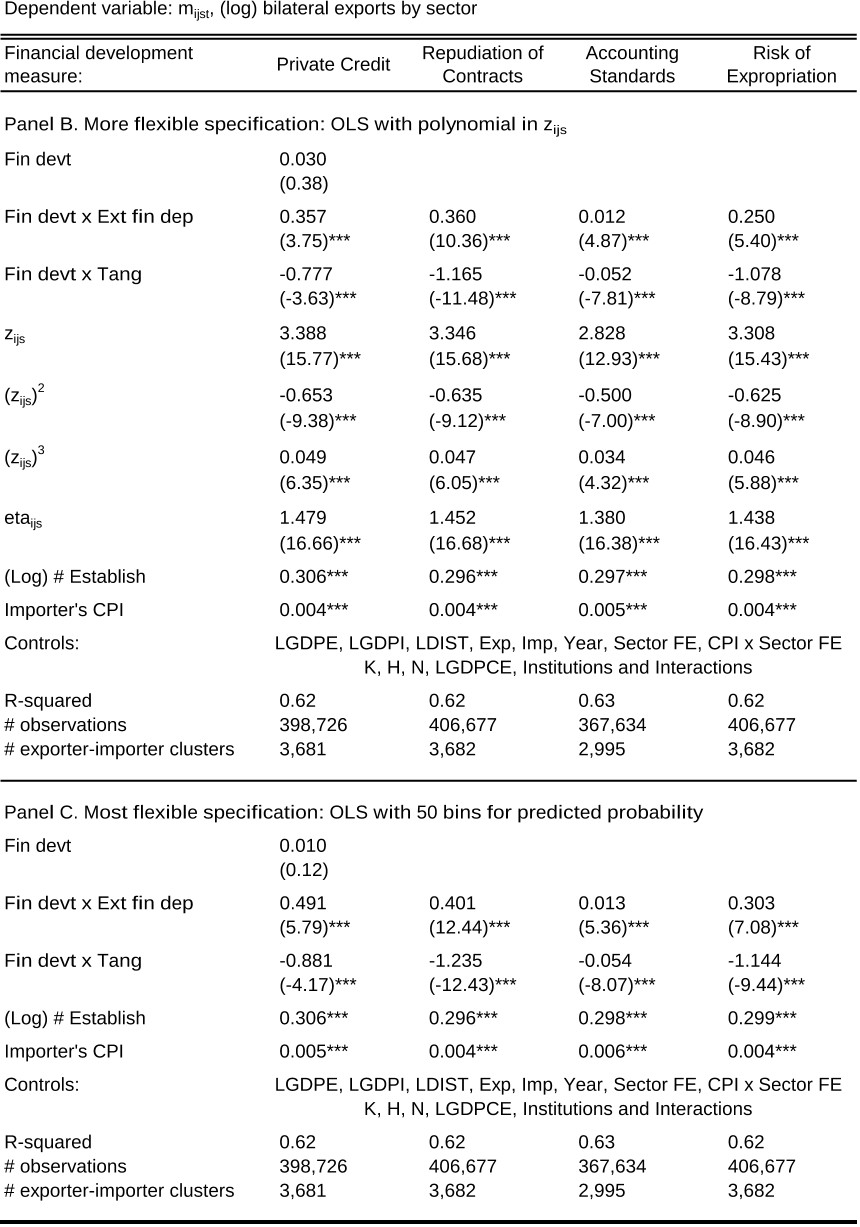Credit Constraints, Heterogeneous Firms and International Trade
Reads0
Chats0
TLDR
This article examined the detrimental consequences of financial market imperfections for international trade and developed a heterogeneous-firm model with countries at different levels of financial development and sectors of varying financial vulnerability.Abstract:
This paper examines the detrimental consequences of financial market imperfections for international trade. I develop a heterogeneous-firm model with countries at different levels of financial development and sectors of varying financial vulnerability. Applying this model to aggregate trade data, I study the mechanisms through which credit constraints operate. First, financial development increases countries' exports above and beyond its impact on overall production. Firm selection into exporting accounts for a third of the trade-specific effect, while two thirds are due to reductions in firm-level exports. Second, financially advanced economies export a wider range of products and their exports experience less product turnover. Finally, while all countries service large destinations, exporters with superior financial institutions have more trading partners and also enter smaller markets. All of these effects are magnified in financially vulnerable sectors. These results have important policy implications for less developed economies that rely on exports for economic growth but suffer from poor financial contractibility.read more
Figures

Table 10. Economic Significance: Predicted vs. Actual Trade Growth 
Table 9. Economic Significance: Comparative Statics 
Table 5. Financial Development and Firm-Level Exports 
Figure 3. The Productivity Cut-off for Exporting 
Table 5. Financial Development and Firm-Level Exports 
Table 1. Export Patterns in the Data
Citations
More filters
Journal ArticleDOI
The Effect of Auditing on Promoting Exports: Evidence from Private Firms in Emerging Markets
TL;DR: This work investigates the effect of auditing on promoting exports for private firms in emerging markets using a sample of private firms from 125 countries between 2006 and 2015 to show that firms that use auditing promote exports in these markets.
Journal ArticleDOI
Offshoring and unemployment in a credit-constrained economy
TL;DR: In this paper, a two-sector small open economy model of offshoring where product markets are perfectly competitive, but capital and labor markets exhibit frictions is developed, where individuals differ with respect to their managerial ability, and choose to become entrepreneurs or workers depending on profit opportunities and labor market conditions.
Posted Content
Quality and Gravity in International Trade
Lisandra Flach,Florian Unger +1 more
TL;DR: In this paper, the authors introduce quality innovations with endogenous sunk costs in a heterogeneous firm model of international trade and derive implications for the gravity equation, which predicts that the effect of fixed costs on exports and on the share of exporters is lower in industries with a higher degree of vertical product differentiation.
Journal ArticleDOI
Financial constraints and global value chain participation: Firm-level evidence from India
Ketan Reddy,Subash Sasidharan +1 more
TL;DR: In this paper, the authors explored the relationship between financial constraints and firm participation in global value chains (GVC) using a rich firm-level data belonging to the Indian manufacturing sector.
Journal ArticleDOI
Financial Frictions and Export Dynamics in Large Devaluations
TL;DR: In this article, the role of financial frictions and balance-sheet effects in accounting for the dynamics of aggregate exports in large devaluations is investigated in a small open economy with heterogeneous firms and idiosyncratic productivity shocks.
References
More filters
Posted Content
Law and Finance
Rafael La Porta,Rafael La Porta,Florencio Lopez de Silanes,Florencio Lopez de Silanes,Andrei Shleifer,Andrei Shleifer,Robert W. Vishny,Robert W. Vishny +7 more
TL;DR: This paper examined legal rules covering protection of corporate shareholders and creditors, the origin of these rules, and the quality of their enforcement in 49 countries and found that common law countries generally have the best, and French civil law countries the worst, legal protections of investors.
Journal ArticleDOI
Law and Finance
TL;DR: In this article, the authors examined legal rules covering protection of corporate shareholders and creditors, the origin of these rules, and the quality of their enforcement in 49 countries and found that common-law countries generally have the strongest, and French civil law countries the weakest, legal protections of investors, with German- and Scandinavian-civil law countries located in the middle.
Journal ArticleDOI
The Impact of Trade on Intra-Industry Reallocations and Aggregate Industry Productivity
TL;DR: This paper developed a dynamic industry model with heterogeneous firms to analyze the intra-industry effects of international trade and showed how the exposure to trade will induce only the more productive firms to enter the export market (while some less productive firms continue to produce only for the domestic market).
Journal ArticleDOI
Finance and Growth: Schumpeter Might Be Right
TL;DR: In this paper, the authors examined a cross-section of about 80 countries for the period 1960-89 and found that various measures of financial development are strongly associated with both current and later rates of economic growth.
ReportDOI
Financial Dependence and Growth
Raghuram G. Rajan,Raghuram G. Rajan,Raghuram G. Rajan,Luigi Zingales,Luigi Zingales,Luigi Zingales +5 more
TL;DR: This paper examined whether financial development facilitates economic growth by scrutinizing one rationale for such a relationship; that financial development reduces the costs of external finance to firms, and found that industrial sectors that are relatively more in need of foreign finance develop disproportionately faster in countries with more developed financial markets.